I have two database tables that contain information about land contracts. They are related with land_contract_annual_price.land_contract_id -> land_contract.land_contract_id.
Table 'land_contract_annual_price'

If a land contract has the value "Rörligt pris" in the field land_contract_price_type, there are related values in the table
land_contract_annual_price. At the moment I'm doing two queries, one to each table. I then merge the results and present the land contract as a nested JSON array like this:
Version 1
[
{
"land_contract_id":118,
"land_contract_name":"Avtalsnamn",
"location_id":71,
"land_contract_link":"",
"land_contract_notes":"",
"land_owner_id":2,
"land_contract_start_date":"2019-07-25",
"land_contract_end_date":"2023-07-25",
"land_contract_terminated":"false",
"land_contract_payment_interval":"Halv\u00e5rsvis",
"land_contract_price_type":"R\u00f6rligt \u00e5rspris",
"land_contract_fixed_annual_price":null,
"land_contract_annual_prices":[
{"year":1, "price":873.00},
{"year":2, "price":77289.00},
{"year":3, "price":8.00},
{"year":4, "price":0.00},
{"year":5, "price":8729.00}
]
}
]
If a land contract has the value "Fast pris" in the field land_contract_price_type, there are no related values in the table
land_contract_annual_price. In that case I present the land contract like this (without the extra array at the end):
Version 2
[
{
"land_contract_id":13,
"land_contract_name":null,
"location_id":null,
"land_contract_link":"https:\/\/www.something.com\/preview\/Sl%C3%A4pvdam%20Edda\/Kddal\/Bddkta\/Besika%20Markavtal%20%20Halmstad%202016-03-08.pdf?role=personal",
"land_contract_notes":"",
"land_owner_id":null,
"land_contract_start_date":"2016-03-08",
"land_contract_end_date":"2026-03-08",
"land_contract_terminated":"true",
"land_contract_payment_interval":"\u00c5rsvis",
"land_contract_price_type":"Fast \u00e5rspris",
"land_contract_fixed_annual_price":"6000.00"
}
]
What I didn't think of, is that this solution is bad when I'm fetchin ALL the land contracts. If I'm going to do a second query to another table whenever a land contract has the value "Rörligt pris" in the field land_contract_price_type, I'm going to do hundreds of extra queries.
Is there a way to create the nested JSON array with one (1) query when a land contract has the value "Rörligt pris" in the field land_contract_price_type?
Thanks!
Below is my current code.
function read($pdo, $Id = null, $ResponseMessage = null) {
$params = [];
$array = [];
$sql = "SELECT lc.Id, lc.Name, lc.LocationId, l.Name AS LocationName, lc.Notes, lc.LandOwnerId, lo.Name AS LandOwnerName, lc.StartDate, lc.EndDate, lc.IsTerminated, lc.PaymentInterval, lc.PriceType, lc.FixedAnnualPrice, lc.Link, lc.Created, lc.Updated, lcap.AnnualPriceYear AS Year, lcap.AnnualPriceAmount AS Amount
FROM LandContract lc
LEFT JOIN Location l ON l.Id = lc.LocationId
LEFT JOIN LandOwner lo ON lo.Id = lc.LandOwnerId
LEFT JOIN LandContractAnnualPrice lcap ON lcap.LandContractId = lc.Id
ORDER BY lc.Id DESC, lcap.AnnualPriceYear DESC
";
if ($Id) {
$sql .= 'WHERE lc.Id = ?';
$params[] = $Id;
}
echo $sql;
$stmt = $pdo->prepare($sql);
$stmt->execute($params);
while ($row = $stmt->fetch()) {
// Fields we want to extract from the select statement into the array
$select_fields = ['Id', 'Name', 'LocationId', 'LocationName', 'Link', 'Notes', 'LandOwnerId', 'LandOwnerName',
'StartDate', 'EndDate', 'IsTerminated', 'PaymentInterval',
'PriceType', 'FixedAnnualPrice ', 'Created', 'Updated'];
if (!isset($array[$row['Id']])) {
// initialize the subarray if it has not been set already
$array[$row['Id']] = array_intersect_key($row, array_flip($select_fields));
if ($row['Year'] != null) {
$array[$row['Id']]['AnnualPrices'] = [];
} else {
$array[$row['Id']]['AnnualPrice'] = $row['FixedAnnualPrice'];
}
}
if ($row['Year'] != null) {
$array[$row['Id']]['AnnualPrices'][] = ['Year' => $row['Year'], 'Amount' => $row['Amount']];
}
}
if (empty($array)) {
$ResponseMessage = new ResponseMessage();
$ResponseMessage->Status = 'Error';
$ResponseMessage->Message = 'No results';
echo json_encode($ResponseMessage, JSON_UNESCAPED_UNICODE);
exit;
}
$Response = array();
if ($ResponseMessage) {
$Response['Status'] = $ResponseMessage->Status;
$Response['Message'] = $ResponseMessage->Message;
}
$Response['LandContracts'] = array_values($array);
echo json_encode($Response, JSON_UNESCAPED_UNICODE);
$stmt = null;
}
